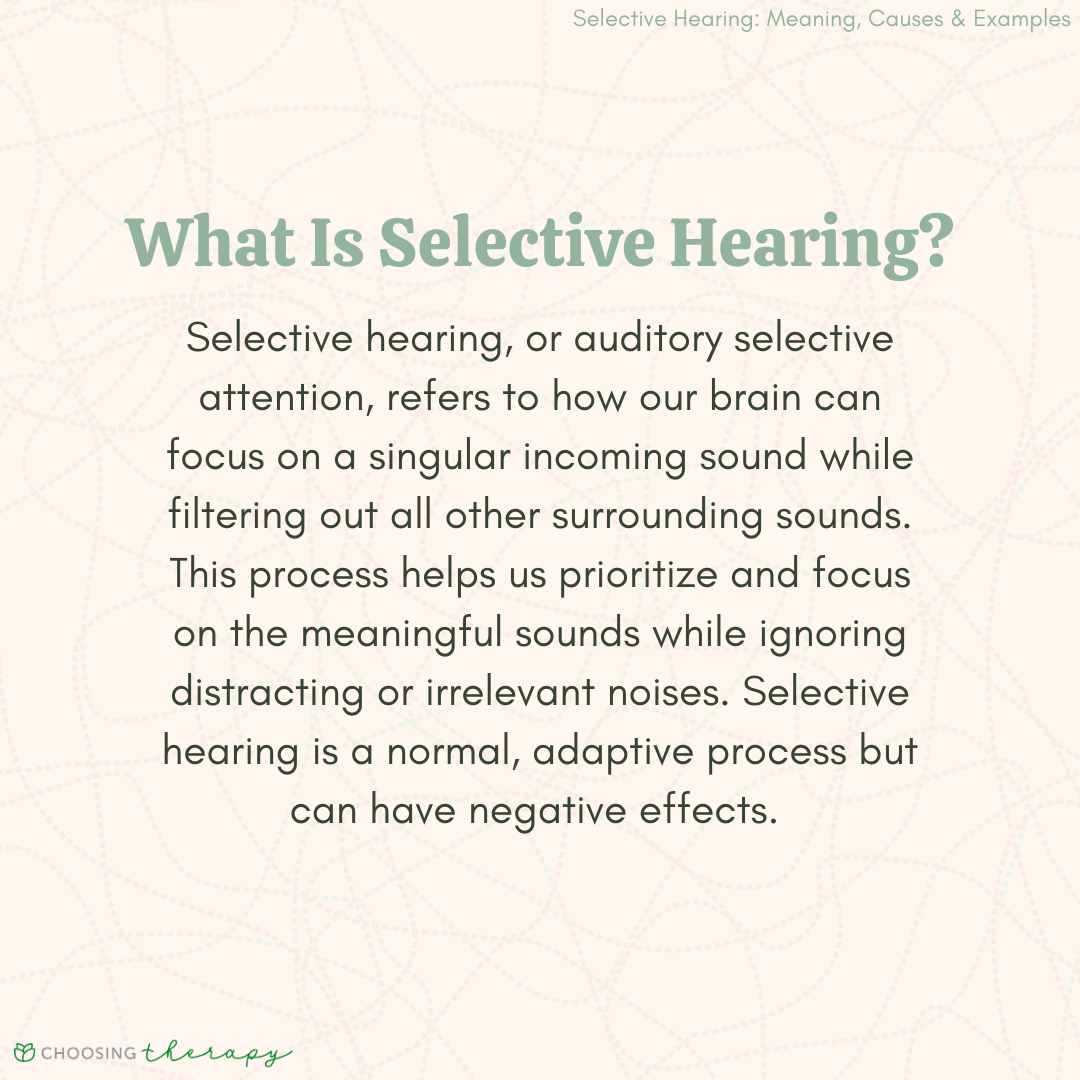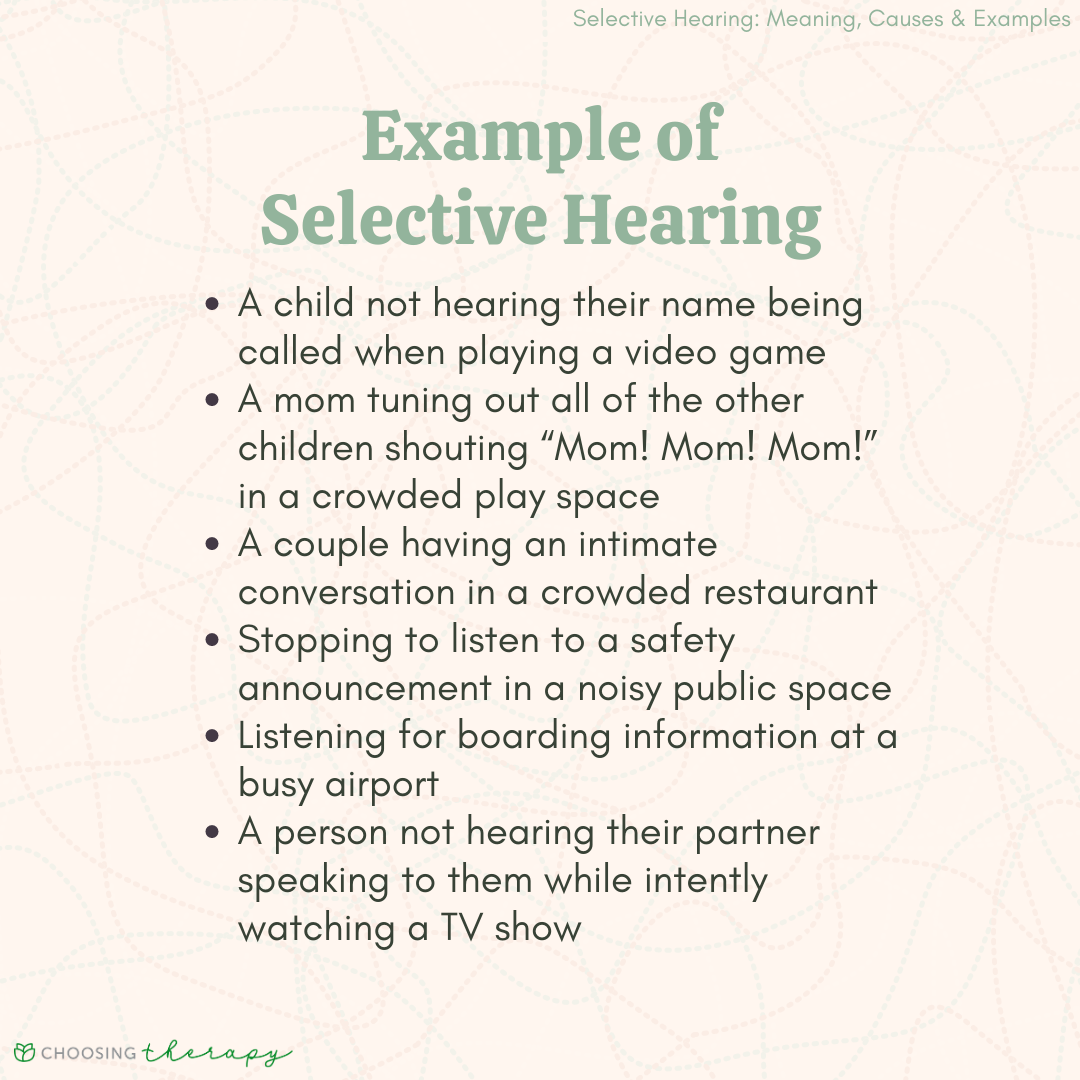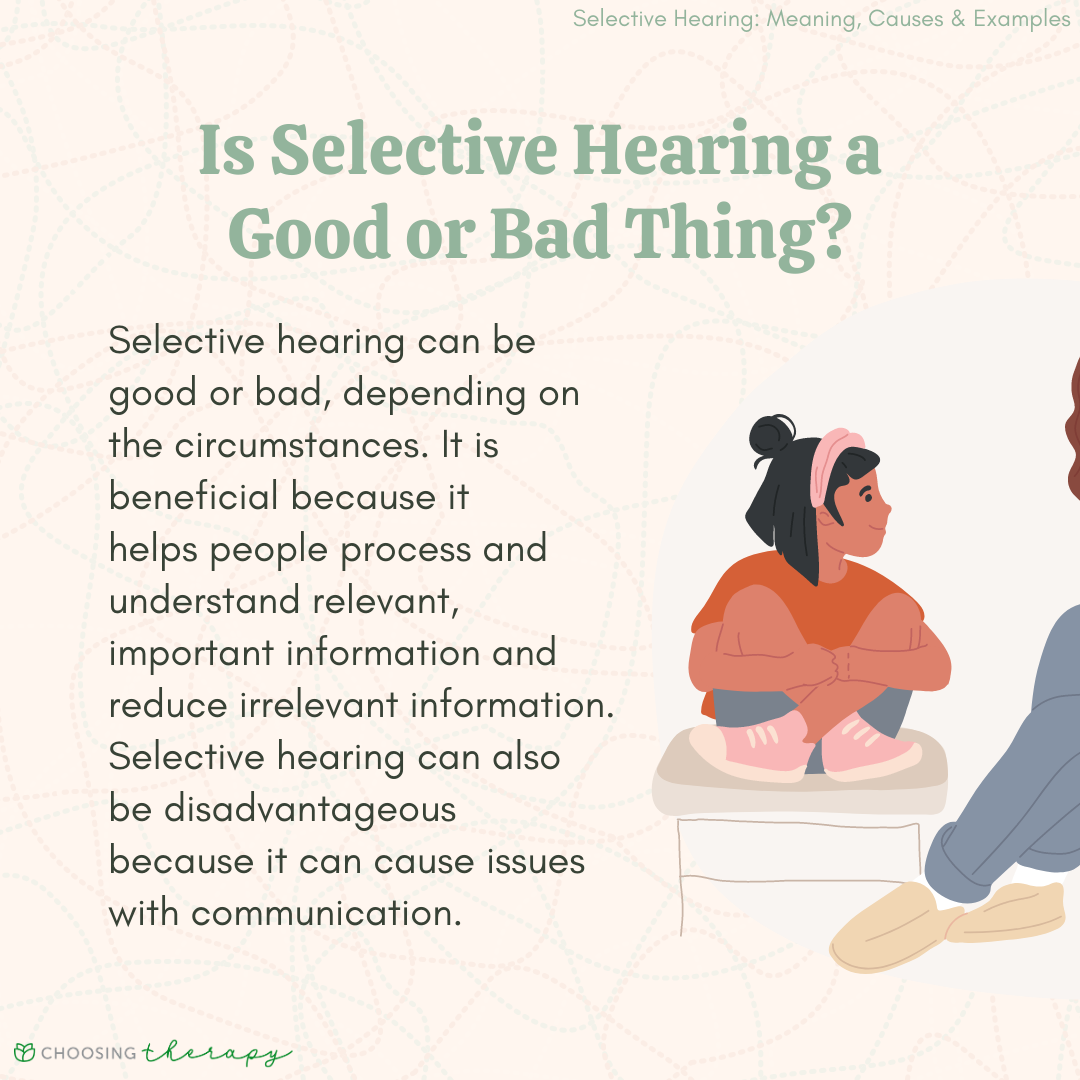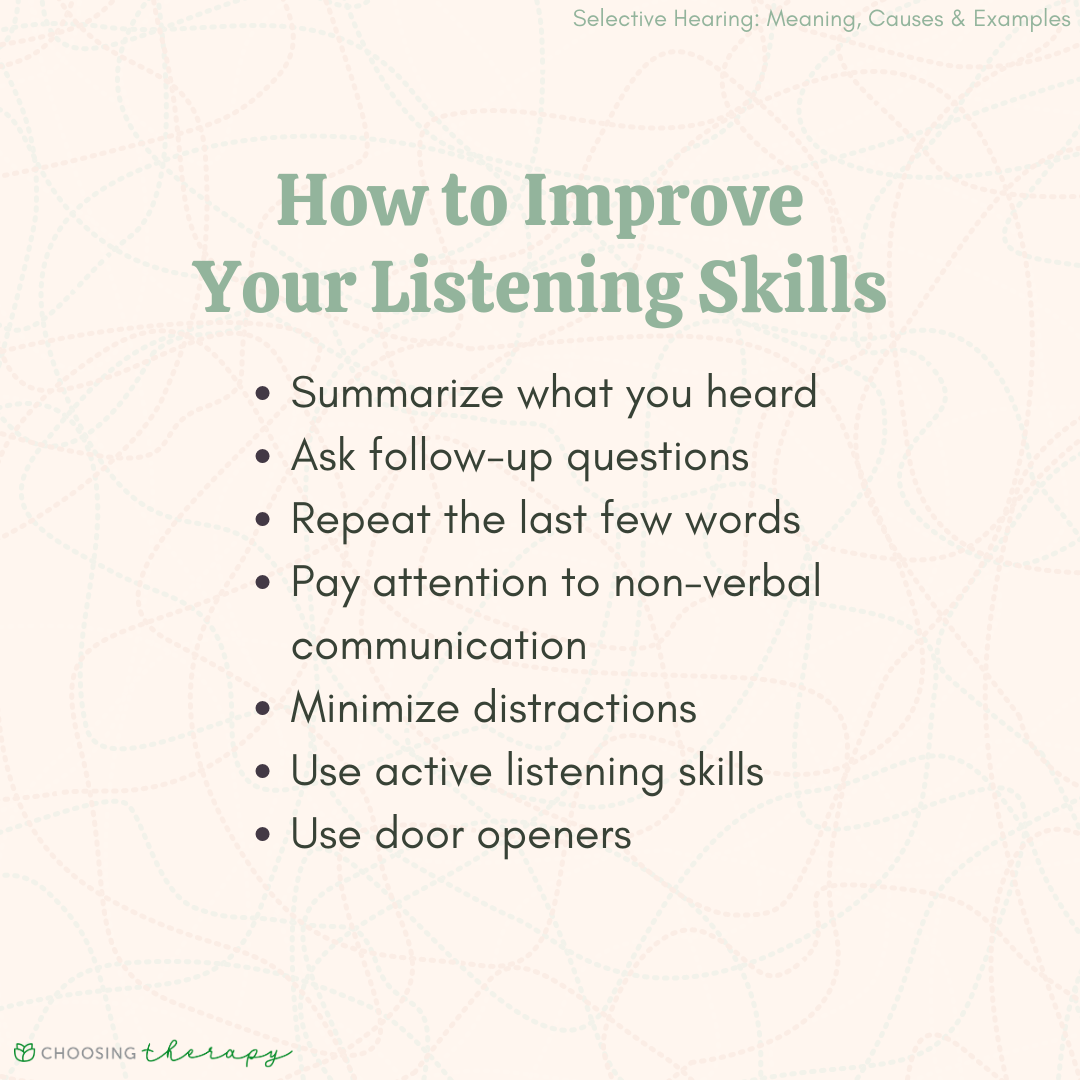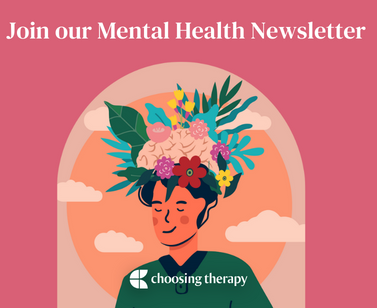Selective hearing is a normal brain function that allows a person to listen to and understand one speaker while tuning out other voices and background noise. It is the reason someone can have a conversation with a friend at a loud concert or participate in a conversation at the table in a crowded, noisy restaurant.
Would you like to try therapy?
Most people (76%) who try therapy have a positive experience! Stat Source BetterHelp has over 20,000 licensed therapists who provide convenient and affordable online therapy. BetterHelp starts at $65 per week. Take a Free Online Assessment and get matched with the right therapist for you.
What Is Selective Hearing?
Selective hearing, or auditory selective attention, refers to how our brain can focus on a singular incoming sound while filtering out all other surrounding sounds. This process helps us prioritize and focus on the meaningful sounds while ignoring distracting or irrelevant noises. Selective hearing is a normal, adaptive process but can have negative effects.
Is Selective Hearing a Hearing Disorder?
Selective hearing is not a hearing disorder but rather a normal brain process that allows the listener to zero in on one sound while tuning out others. One study shows that when participants were given multiple voices to listen to, the auditory parts of the brain only registered the targeted speaker.1 Selective hearing can be a mostly subconscious process, with listeners switching their attention from one sound to another without realizing it.
Examples of Selective Hearing
Examples of selective hearing can include someone not hearing their name being called when they are engaged in another task, a person being able to converse in a noisy space, or listening for important announcements when there is a lot of background noise. Selective hearing can be helpful but can also cause frustration and relationship problems.
Here are some examples of selective hearing:
- A child not hearing their name being called when playing a video game
- A mom tuning out all of the other children shouting “Mom! Mom! Mom!” in a crowded play space
- A couple having an intimate conversation in a crowded restaurant
- Stopping to listen to a safety announcement in a noisy public space
- Listening for boarding information at a busy airport
- A person not hearing their partner speaking to them while intently watching a TV show
How Does Selective Hearing Work?
Sound comes into the brain through the inner ear, where the brain’s gatekeeping system reduces the volume of unwanted sounds and boosts the volume of important sounds. This helps people prioritize relevant information while muting distractions.
Scientists have studied the ways that attention affects brain waves related to hearing. They found that attention changes brainwaves and processes, including P300, ASSR, FFR, Auditory Late Latency Response, Auditory Middle Latency Response, and Otoacoustic Emissions. When people pay attention to specific sounds, they are actually changing their brain waves depending on whether they are actively or passively listening.2
Top Rated Online Therapy Services BetterHelp – Best Overall “BetterHelp is an online therapy platform that quickly connects you with a licensed counselor or therapist and earned 4 out of 5 stars.” Visit BetterHelp Online-Therapy.com – Great Alternative In addition to therapy, all Online-Therapy subscriptions include a self-guided CBT course. Visit Online-Therapy.com
Is Selective Hearing a Good or Bad Thing?
Selective hearing can be good or bad, depending on the circumstances. It is beneficial because it helps people process and understand relevant, important information and reduce irrelevant information. Selective hearing can also be disadvantageous because it can cause issues with communication.
Without selective hearing, going to any crowded or noisy place would be extremely stressful because all the sounds would be coming in simultaneously.
It can also harm romantic and platonic relationships because it can cause someone to miss important information when focused on something else.
Impacts of Selective Hearing on Relationships
Selective hearing can harm or strengthen relationships, depending on its use. It can decrease healthy communication, allowing one partner to tune out the other partner’s voice. Similarly, it allows children to tune out their parents’ voices, which can be frustrating for parents and, at times, even dangerous. Conversely, parents can tune out their children’s voices and may miss something they need to communicate.
On the other hand, selective hearing can allow a person to tune in to their loved one’s voice in a noisy space. This allows a couple to enjoy date night conversation at a crowded festival or a parent to tune in and listen to their child with many kids around.
How to Improve Your Listening Skills
Selective hearing may not work for someone for many reasons, and cultivating good listening skills is important for work, personal and family relationships. Good listening skills accomplish two main objectives: to understand the material that is being shared while also improving the relationship by showing caring and concern for the speaker.
Here are some tips on how to improve your listening skills:
- Summarize what you heard: After listening carefully, the speaker summarizes what they heard the speaker say, using words like “if I understand you correctly, you’re saying that…” This helps the speaker clarify that they have understood correctly and helps the speaker feel heard and understood.
- Ask follow-up questions: Follow-up questions can help the listener gather more information and clarify what they have understood so far.
- Repeat the last few words: This simple tool can help the listener ensure they stay on track with the speaker’s words. It also allows the listener to take a brief pause to process the information that is coming in.
- Pay attention to non-verbal communication: Non-verbal communication conveys as much, if not more, than words for both the speaker and listener. Non-verbals include pauses, body language, and posture that can convey emotions and connection.
- Minimize distractions: Finding a quiet space free from other noises and distractions can help the listener focus more intently on what the speaker is saying.3
- Use active listening skills: Active listening skills include non-verbals like nodding, leaning forward with arms uncrossed, and making eye contact with the speaker. This can also include verbal cues like “umm hmm, I understand, go on…”
- Use door openers: Door openers are open-ended questions or statements that invite the speaker to expand on what they are saying. Some examples include “tell me more about that”, “then what happened?” or “that sounds interesting”.4
How to Deal With Selective Hearing?
When a family member, child, partner, coworker, or friend has selective hearing, and you are being tuned out, it can be frustrating and tempting to take it personally. Remember that this is most likely not something they are doing intentionally. There are things you can do to help a person focus so that you can be heard and understood.
Here are some ways to deal with selective hearing:
- Ask direct questions: Asking direct questions can help simplify and clarify the information you are asking for and help someone focus their attention.
- Tap them before beginning to talk: Making sure you have the listener’s attention before speaking can allow them to focus and tune out other background noises and distractions.
- Consider what else they may be dealing with: ADHD and other sensory processing disorders are conditions that can cause delays in spoken-word processing, especially in distracting conditions with a lot of background noise. The listener may be struggling to pay attention or understand.
- Keep it short and sweet: When someone struggles with selective hearing, keeping things short, direct, and to the point can help them register what you are saying.
- Rule out hearing loss: If the person is your child, family member, or loved one, you might want to suggest that they be evaluated for hearing loss. It is possible that they are not dealing with selective hearing at all but with a medical problem that makes it more difficult to hear when there is a lot of ambient noise.
- Model good listening skills: Actively listening, clarifying, and asking questions can create a culture of good communication and model what good listening looks like.
- Make eye contact: Making eye contact is a good way to get and keep someone’s attention when speaking. Take a moment to get their attention, make eye contact, and be sure they are listening before speaking.
In My Experience
Selective listening can be a frustrating experience for both the speaker and the listener. For the speaker, it can result in feeling unheard and unimportant. It can be frustrating for parents who can’t get their child’s attention and frustrating for a partner or coworker who doesn’t feel listened to.
For a person with selective hearing, dealing with multiple auditory inputs at once can feel overwhelming. When working memory is low, especially when someone has ADHD or a sensory processing disorder, it can be difficult to tune out background noise and distractions. The good news is that there are things both the speaker and listener can do to hear and be heard. This improved connection, communication, and relationships.
To help our readers take the next step in their mental health journey, Choosing Therapy has partnered with leaders in mental health and wellness. Choosing Therapy is compensated for marketing by the companies included below. Online Therapy BetterHelp Get support and guidance from a licensed therapist. BetterHelp has over 20,000 therapists, who provide convenient and affordable online therapy. Complete a brief questionnaire and get matched with the right therapist for you. Get Started Psychiatry, with you in mind Talkiatry Our Psychiatrists Can Diagnose Your Condition, Prescribe Medication, And Monitor Your Progress. Most psychiatry visits cost patients $30 or less* Free Assessment Drinking Moderation Sunnyside Want to drink less? Sunnyside helps you ease into mindful drinking at your own pace. Think lifestyle change, not a fad diet. Develop new daily routines, so you maintain your new habits for life. Take a 3 Minute Quiz Relationship Help OurRelationship (Free Couples Course) OurRelationship has been proven to help couples improve communication, intimacy, and trust. 94% would recommend it to a friend. Get Started Mental Health Support Group App Circles Anytime, anonymous, and free. Never feel alone during life’s greatest challenges. Drop-in to live conversations and share thoughts, ask questions, or learn from others on the same journey. Join Circles Now Free Prescription Discount Card Optum Perks Save up to 80% on most prescriptions. Optum Perks provides discounts at over 64,000 pharmacies nationwide. No memberships or costs to you, ever. It’s really that easy. Get your card and start saving. Get the discount card! *Includes copayment, deductible, coinsurance, and $0 Visits. Excludes no shows.Additional Resources
Online Anxiety Test A few questions from Talkiatry can help you understand your symptoms and give you a recommendation for what to do next. How Does ERP Help With Intrusive Thoughts? Obsessive compulsive disorder (OCD) is a psychiatric condition marked by the presence of obsessive thoughts, images, doubts, or urges, followed by compulsive behaviors or acts aimed at easing the distress caused by the obsession. While the content of the obsessions can take many forms, they are always repetitive, persistent, involuntary, and intrusive, and they often result in a great deal of anxiety for the person experiencing them.





